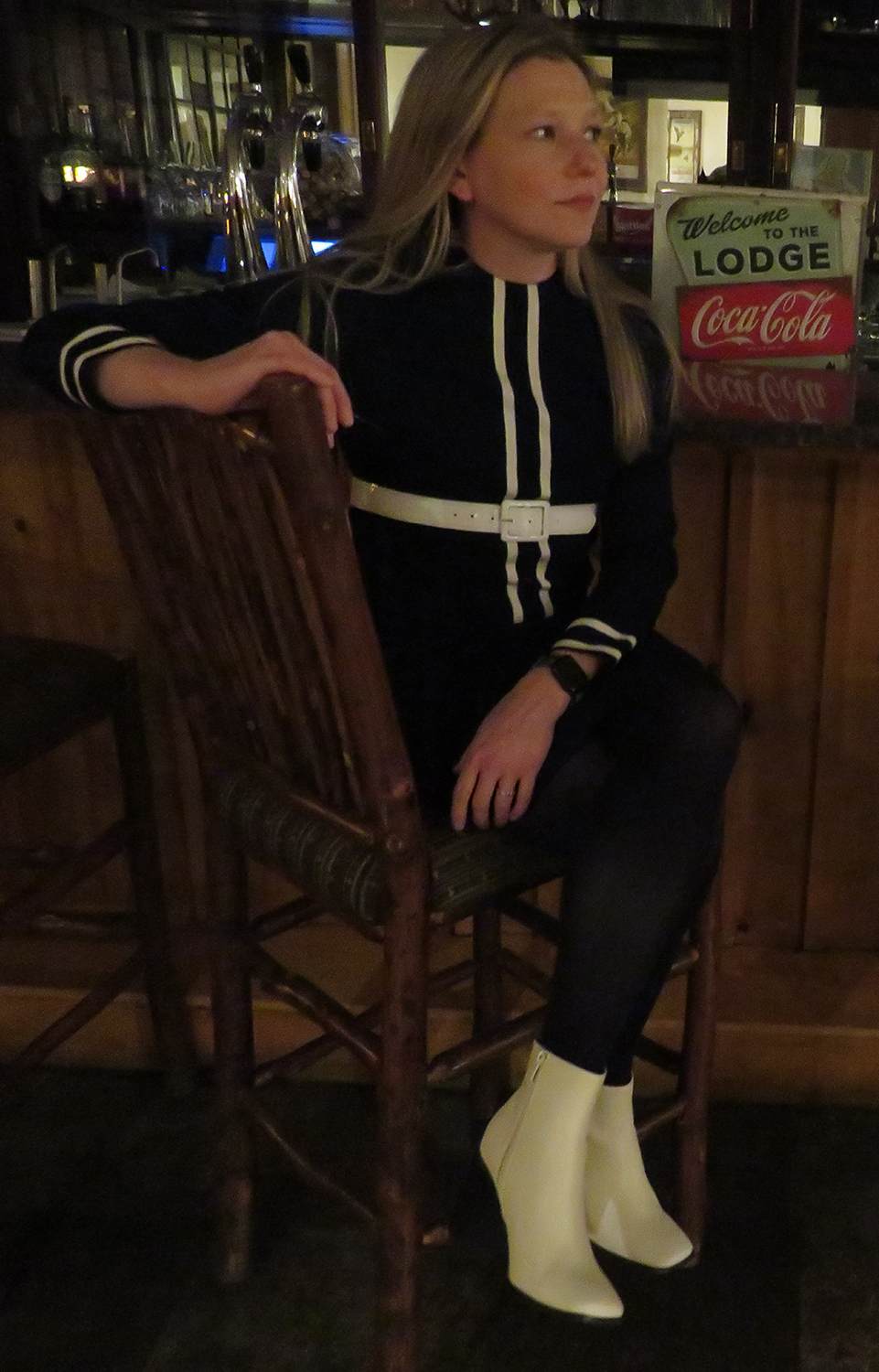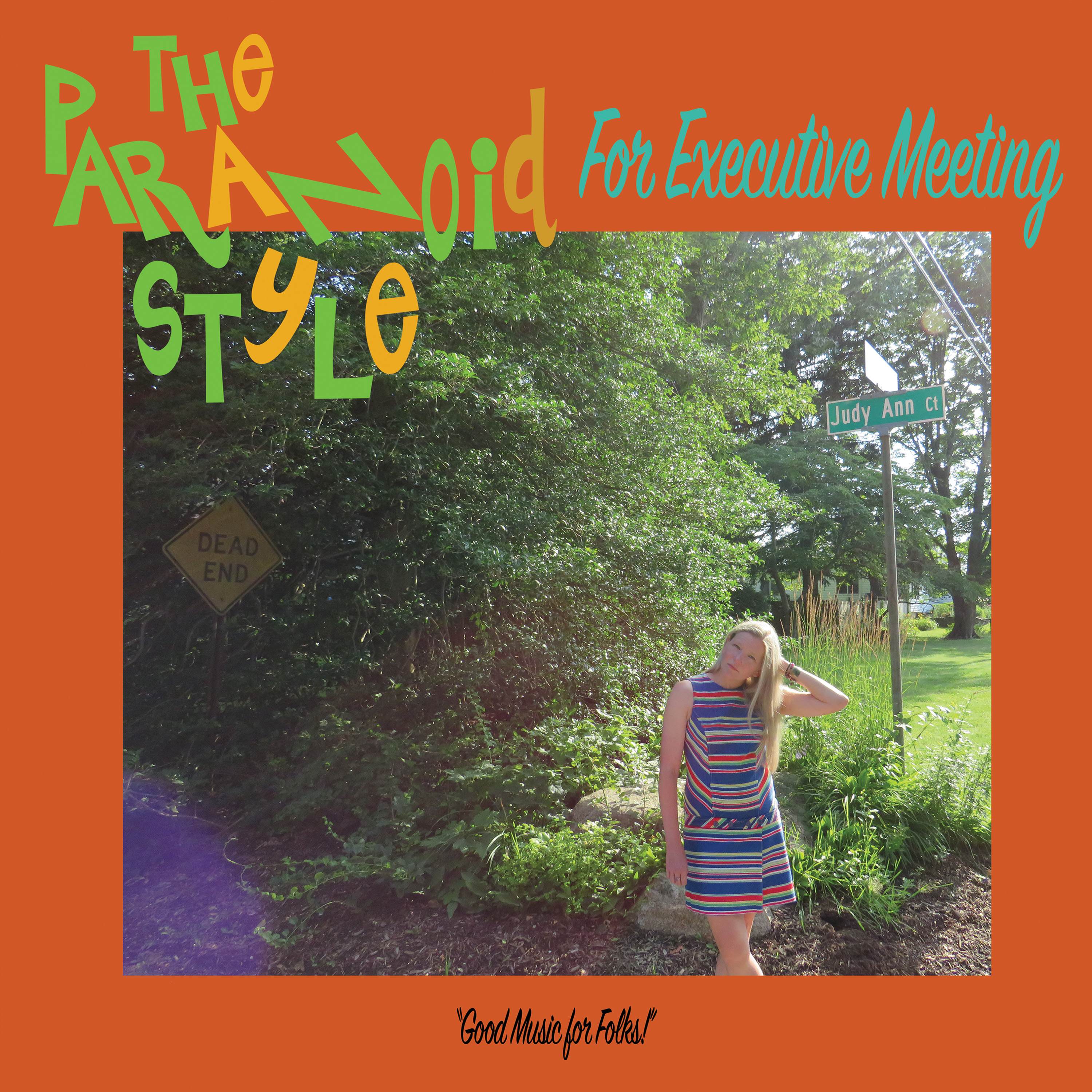The Guest List is a regular book column that surveys the reading habits of our favorite musicians. For this edition, we spoke with Elizabeth Nelson, the lead singer/songwriter for The Paranoid Style. She’s also one of the best music writers around, and the songs on her band’s new album, For Executive Meeting, are as brilliant and piercing as the observations in her writing. Elizabeth was nice enough to take time out of her busy schedule to answer our questions about all things bookish.
SwR: Your band takes its name from a Richard Hofstadter essay about the American tradition of conspiracy belief. Tell us about the link between your band’s name and Hofstadter’s essay.

Elizabeth Nelson: I was always fascinated by Hofstadter’s central thesis that there is something endemic to the American psyche which is profoundly suspicious. This idea that sinister forces are constantly plotting against decent, God-fearing people seems at least somewhat hardwired. Around the time I was starting the band, Obama had just been reelected by a comfortable margin. There was a feeling of complacency amongst certain people I was around; they seemed to feel the major cultural battles regarding equality had functionally been won. This was not my view for a variety of reasons. I had traveled the country as part of my work in education policy—I would visit schools to research the implementation of literacy interventions—and some of those experiences were disquieting to me. There was a tangible rage simmering in many of these cities and towns, and a great fear of what the Obama administration was going to inflict on rank-and-file Americans. You know—weird shit. Obamacare was going to have death panels. The UN was going to invade and become an occupying army. Obviously, this was cynically abetted by the right-wing media complex, but the appetite was there and you could feel it.
There was also a feel-good strain of indie rock during that time that seemed to me to reflect the complacency of the chattering classes: Arcade Fire, Vampire Weekend, whatever. Those bands are fine, I guess, but they weren’t for me. Seemed like private school elites parroting back an unearned sense of triumph to their cohort. I couldn’t relate at all. So I decided to call my group The Paranoid Style, and I resolved that our songs would be, at least in part, about this looming menace. It was definitely a zag—not the sort of thing tastemaking blogs were dining out on at the time. A lot of people told me it was a bad idea. I remember one dude who used to work in the music industry saying it was an awful name and no one would ever care about my music. But it worked out okay. I mean, not for America, of course.
SwR: The cover of 2016’s Rolling Disclosure features a photo of you sitting on a chair in the middle of a railroad track reading Raymond Chandler. What do you like about his fiction? What’s your favorite Chandler novel?
EN: Oh man, that’s a tough one. I guess I like just about everything about Raymond Chandler. He’s not pussyfooting around, and he’s not afraid to size up the thing and look it right in the eyes—the darkness and madness. He’s not too sentimental about things like murder, and he understands that the corruption and the perniciousness run deep in America. He’s not even too judgmental about that; he just evinces that awareness. His prose is economical, but his narratives can sometimes kind of ramble, and I like that too. I love Dashiell Hammett and James M. Cain immensely as well, but Chandler is often a little woolier. You could argue that for an ace private investigator, Philip Marlowe spends an awful lot of time being totally confused. He makes a lot of mistakes. I wouldn’t argue that it’s his best book, but I have a special affection for The Lady in the Lake. It’s just delightfully grim. All this carnage and everything means less than zero. It’s transporting.
SwR: In the lyrics to “Barney Bubbles,” there are a pair of lines that manage to sum up the album’s bleak worldview: “You know the game is fixed / You know your lot in life is fucked.” Yet the songs on For Executive Meeting are full of wit and humor, despite the dark truths they express. Do you find yourself drawn to authors who write in a similar register?
EN: Sure, of course. I have always felt a deep identification with the underdog. But the point of “Barney Bubbles” for me was not to dwell on the sadness of his end—how he became overwhelmed—but rather on the triumph of his achievement. The way he forced so many of us to see the world as it is rather than how it had been cannily packaged. I think of Bubbles as being smoothly subversive enough to smuggle in home truths to mainstream culture like The Simpsons did in the late 90s. As a truth teller, he was an accomplished assassin.
SwR: You wrote about the tragedy of P.G. Wodehouse’s Berlin broadcasts when “Exit Interview with P.G. Wodehouse” premiered back in February. For Wodehouse novices, what are the best books to start with? What about a deep cut that hasn’t gotten its due?
EN: Wodehouse was, of course, staggeringly prolific, so there’s a lot to choose from! The Inimitable Jeeves from 1923 is full of wonderful stuff and is a good introduction to his voice and themes. The entire Blandings Castle Saga—the novels Something Fresh, Leave It To Psmith, Summer Lightning, and Heavy Weather—is an extraordinary instance of comedic world building. He wrote those books between 1915 and 1933, and I’d consider them all pretty indispensable. After World War II and the scandal, his writing was less good, but Stiff Upper Lip, Jeeves from 1963 is a lot of fun.
SwR: On “The Worst of My Love,” there’s a shout out to Purple Mountains. Talk about what David Berman has meant to you as a writer.
EN: It’s a difficult one to talk about, right? It’s hard to find words to do justice to the overarching brilliance and boundless empathy of his work. I guess to take just one element of something I took away from Berman’s song: there was a certain freeness with language, a playfulness that seemed unencumbered by convention. His songs have a wonderful way of taking unexpected turns or surprise digressions. He plays by the normal rules of songwriting then, all of a sudden, he doesn’t. He coins hilarious phrases: “He came at me with some fist cuisine” to describe a guy trying to punch another guy out. Tremendous. His mood palette is remarkable. There is often an almost uncanny overlap between the laugh-out-loud funny and the devastatingly tragic. Because a lot of the Silver Jews recordings are pretty lo-fi, it can seem like he’s just doing this kind of off the top of his head. But there is actually so much craft there. It’s a conjurer’s trick: making it seem offhand when it’s actually been incredibly well-thought-out. He was maybe a bit of a sandbagger in that way. He reminds me most of all of Warren Zevon—“Trains Across The Sea” could have been on Sentimental Hygiene. I miss him terribly, but we were lucky to have him for as long as we did.
SwR: “Moveable Feast Blues” takes its title from Hemingway. Can you talk about how that reference plays out in the lyrics?
EN: Ha. Well, I guess you could say it’s a banquet of sentiments. There’s kind of an Old Man and the Sea joke in there too. And a little bit about Philip Roth’s The Human Stain. It’s not, strictly speaking, a very friendly song. But it’s got a good beat!
SwR: The record nods to other great writers—from Shakespeare to Kerouac—so clearly you’re a hardcore lit-lover. Give us three classics that mean a lot to you, and three contemporary novels you love.
EN: Well, my favorite writer is Charles Portis. I almost literally don’t know what I would do without his novels. It’s almost impossible for me to pick just one, but I guess I’ll choose Gringos because I sometimes feel like it’s a little overlooked. Like most people, I am heavily susceptible to the charms of A Confederacy Of Dunces. And obviously Joseph Heller’s Catch-22 is crucial for understanding the world.
A music industry yarn that I’m not too sure many people read was Bill Flanagan’s 2000 novel A&R. It’s a very funny, very dark book about the biz. Flanagan is a famous and decorated journalist, but his fiction is really good as well. I’m probably blurring the lines between contemporary and classic at this point, but I love just about everything by Ross Thomas. I really dig the ones that feature the Artie Wu character like Out On The Rim. Artie Wu is my jam. And here’s a preview: Owen King’s forthcoming novel The Curator is going to blow people’s minds. It comes out next year. All his books are good, but this one is head-caving.
SwR: You’re also known for your work as a music critic. Which music writers inspired you before you started writing? Who are some current music writers that you admire?
EN: Well, when I was a young music fan, Ellen Willis and Bob Christgau were eye-opening for sure. Nick Tosches, definitely. His Jerry Lee Lewis biography—astounding. Current writers: Jessica Hopper, Amanda Petrusich, Regina Bradley, Anna Gaca, Ann Powers, Annie Zaleski, Kimberly Mack, Caryn Rose, Carrie Battan. Almost all of my favorite current music writers are women, which is a rad thing you couldn’t have said thirty years ago.
SwR: Top three music bios—go!
EN: Oh man, I already mentioned Hellfire by Nick Tosches, but I’d consider that indispensable. Holly George-Warren’s Alex Chilton bio—A Man Called Destruction—was outstanding, I thought. David Cantwell’s Merle Haggard biography The Running Kind is wonderful. I could probably go on all day, so I’ll stick with those. Oh, and Amy Rigby’s memoir Girl to City is fantastic.
SwR: What about music histories or essay collections? Any favorites you can recommend?
EN: Well, Jessica Hopper’s The First Collection of Criticism by a Living Female Rock Critic is a stone classic. I read it all the time. Robert Christgau’s Is It Still Good To Ya? is like an instruction manual for that kind of writing. Air Guitar by Dave Hickey. Music In A New Found Land by Wilfrid Mellers. And Paul Gorman’s The Wild World of Barney Bubbles has a special resonance for me, of course, but it’s absolutely spectacular.
SwR: Is there a music book that you think more people should know about?
EN: I love the memoir A Riot Of Our Own, which was written by The Clash’s roadie Johnny Green. It’s a really fascinating bird’s-eye view of those guys and their personalities and work habits. I’m not too sure many people have read it, but it’s probably my favorite book about The Clash.
SwR: What’s the last really good book you read?
EN: Tom Scharpling’s memoir It Never Ends is funny in every way I expected it to be and devastating in ways I was completely unprepared for. Scharpling reveals the details of his profound teenage depression, which led to an increasingly dire regiment of medications, institutions, and ultimately electroshock therapy. But, like the oft-mentioned Rocky, he rallies! That the book is consistently funny throughout is a testimony to Scharpling’s Benchley-like genius for alchemizing psychological anguish into comic gold without ever sacrificing the true weight of his travails. The pain is omnipresent, the jokes are endless, and the endgame is subversively uplifting.

